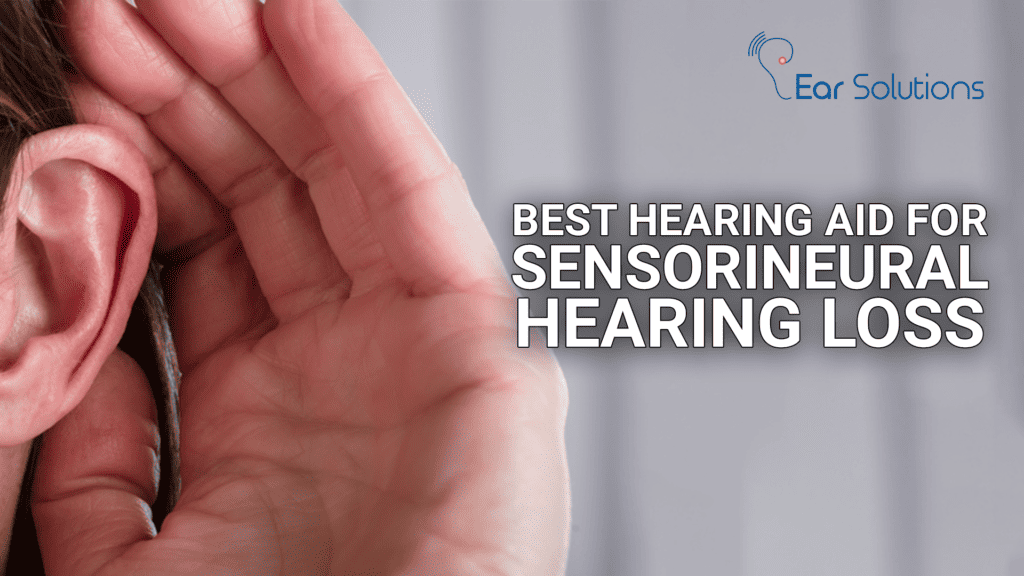Sensorineural hearing loss is a common type of hearing impairment that affects millions of people worldwide. It occurs when there is damage to the inner ear or the auditory nerve pathways that transmit sound signals to the brain. This type of hearing loss is permanent and cannot be fully restored, but there are various treatment options available that help in managing and improving hearing abilities. This blog will cover a variety of sensorineural hearing loss causes, treatments, and the best hearing aids for sensorineural hearing loss.
Understanding the Causes of Sensorineural Hearing Loss
Sensorineural hearing loss can have several causes, including:
Aging: Age-related changes also known as presbycusis in the inner ear structures and auditory nerve can lead to gradual hearing loss. Presbycusis typically affects high-frequency sounds and is the most common cause of sensorineural hearing loss in adults.
Genetics: Some forms of sensorineural hearing loss have a genetic component, meaning they are inherited from parents. Genetic mutations can affect the development or function of the inner ear structures, leading to hearing loss.
Noise Exposure: Long-term exposure to loud noises, such as industrial machinery or loud music, can damage the delicate hair cells in the inner ear. This type of hearing loss is known as noise-induced hearing loss and is also a common cause of sensorineural hearing loss.
Ototoxic Medications: Certain medications, such as certain chemotherapy drugs, antibiotics (e.g., aminoglycosides), and non-steroidal anti-inflammatory drugs (NSAIDs), can damage the inner ear and cause sensorineural hearing loss.
Trauma or Injury: Head trauma or exposure to sudden loud sounds (acoustic trauma) can result in damage to the inner ear or auditory nerve, leading to hearing loss.
Infections and Diseases: Infections like meningitis, mumps, and measles can cause sensorineural hearing loss if they affect the inner ear. Other medical conditions, such as autoimmune disorders or Meniere’s disease, can also lead to sensorineural hearing loss.
Effects and Symptoms of Sensorineural Hearing Loss
Sensorineural hearing loss can affect an individual’s ability to hear and understand sounds across different frequencies. Some of the common symptoms include:
- Difficulty understanding speech, especially in noisy environments.
- Tinnitus, is a persistent ringing, buzzing, or hissing sound in the ears.
- Trouble hearing high-pitched sounds, such as birdsongs or doorbells.
- Reduced sensitivity to sound or the perception of muffled or distorted sounds.
- Difficulty localizing the source of sounds.
Sensorineural Hearing Loss Treatments: Empowering Your Hearing Health
While sensorineural hearing loss is typically permanent, there are some treatment options and strategies to manage and improve hearing abilities:
Hearing Aids: Hearing aids are the most common and effective treatment option for sensorineural hearing loss. Hearing machines amplify sounds to make them clearer and more audible. Modern digital hearing aids can be customized to an individual’s specific hearing needs and can address a wide range of hearing loss including sensorineural hearing loss.
Cochlear Implants: Cochlear implants are surgically implanted devices that directly stimulate the auditory nerve to provide sound signals to the brain. They are designed for individuals with severe to profound sensorineural hearing loss who do not benefit from hearing aids alone.
Assistive Listening Devices: Assistive listening devices, such as FM systems or loop systems, can be used in conjunction with hearing aids to improve hearing in specific situations, such as lectures or group conversations.
Communication Strategies and Rehabilitation: Speech therapy and auditory rehabilitation programs can help individuals with sensorineural hearing loss improve their communication skills and maximize their hearing abilities. Some techniques may include lip-reading, auditory training, and learning to use visual cues effectively.
Protecting Remaining Hearing: It is essential to take precautions to prevent further damage to the remaining hearing. This includes avoiding loud noises, using hearing protection in noisy environments, and discussing ototoxic medication risks with healthcare providers.
Discover the Best Hearing Aids for Sensorineural Hearing Loss
Sensorineural hearing loss cannot be fully restored but at Ear Solutions Clinic, we specialize in providing top-quality hearing aids that cater to individuals with sensorineural hearing loss. Our experienced and dedicated audiologists are dedicated to helping you regain crystal-clear sound and improve your overall hearing experience.
Cutting-Edge Technology: We offer state-of-the-art hearing aids that incorporate the latest advancements in technology. These devices are equipped with advanced signal processing algorithms, allowing for superior sound clarity and speech understanding.
Customized Solutions: At Ear Solutions Clinic, we understand that every individual’s hearing needs are unique. Our audiologists will conduct a comprehensive evaluation to assess your hearing loss and recommend personalized solutions. We take into consideration your lifestyle, hearing preferences, and budget to find the best hearing aids that align with your specific requirements.
Comfort and Discretion: We offer a wide range of hearing aids that prioritize comfort and discretion. Our selection includes various styles and sizes, from behind-the-ear (BTE) to in-the-ear (ITE) options, ensuring a comfortable fit and discreet appearance.
Ongoing Support: At Ear Solutions Clinic, we believe in providing comprehensive care beyond the initial fitting of hearing aids. Our team is committed to providing ongoing support, including follow-up appointments, adjustments, and maintenance services.
Experience Unparalleled Hearing Care at Ear Solutions Clinic as we are dedicated to providing the highest level of hearing care to individuals with sensorineural hearing loss.
Contact Ear Solutions and get the Best Hearing Aid for Sensorineural Hearing Loss.




